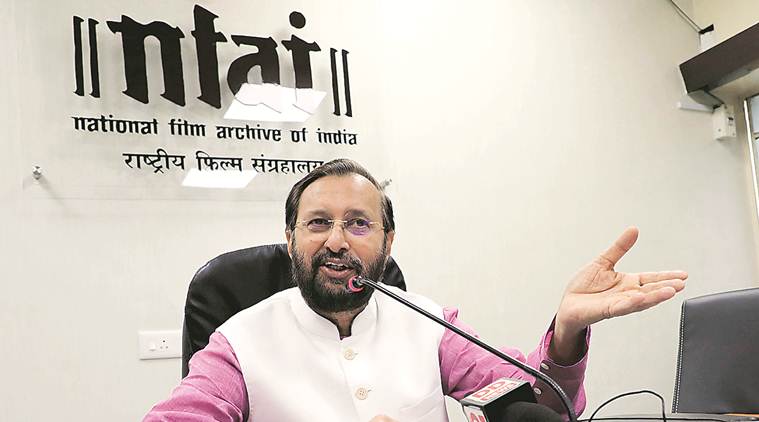
The Jaykar Bungalow, located on the campus of the National Film Archive of India (NFAI) on Law College Road, will reopen next month in its brand new role as a digital film library, which will offer film aficionados an opportunity to engage with, and take notes from, Indian cinema of yesteryear. Information and Broadcasting Minister (I&B) Prakash Javadekar, who visited NFAI on Sunday to conduct a review of National Film Heritage Mission (NFHM), the Centre’s Rs 597-crore celluloid film conservation programme, said the Narendra Modi-led central government was serious about preserving the rich history of Indian cinema.
Jaykar Bungalow was once home to Mukundrao Ramrao Jaykar, a barrister who was also the first vice-chancellor of the Savitribai Phule Pune University. The bungalow, classified as a grade I heritage structure by the Pune Municipal Corporation, was built in 1945. Later, it was handed over to the Film and Television Institute of India (FTII), where it was initially used as the residence of the institute’s chief Jagat Murari in the 1960s. The building was also used as a girls’ hostel briefly, before becoming the NFAI’s office in 1973.
“The Jaykar Bungalow will have a digital library where film lovers will have easy access to books and to the film library, documentation section, non-film materials, among other things,” said Javadekar. The digital library will also provide a personalised film viewing space for those seeking to study the films.
On display: Digital versions of films, posters, magazines
The work to restore Jaykar Bungalow and convert it into a digital library started in the middle of 2016. This project aims to make the many treasures of Hindi cinema, which were digitised by NFAI recently, accessible to film lovers. The Archive has also digitised a large number of non-filmic material such as posters, photographs and magazines. Apart from that, it aims to digitise nearly 1,000 feature films and 960 short films under NFHM.
Currently, viewers can use the steenbeck tables or watch the film in the auditorium. The researchers have to pay Rs 50 per hour to use the steenbeck table and Rs 2,000 per hour for the auditorium. An additional fee of Rs 100 for per reel of black and white films, and Rs 200 for colour films, is charged.
The NFAI will also start construction work to build new film vaults at the 3-acre plot it had acquired from the Film and Television Institute (FTII) of India last year, said Javadekar.
“More films have to be stored at the Archive… however, there’s a shortage of space as all the vaults are full. So, we are building additional vaults and a plot for that has been acquired from the FTII. The work will commence soon,” said the Union minister.
In December 2018, the FTII and NFAI, which are both under the jurisdiction of the I&B Ministry, had signed a Memorandum of Understanding for transfer of land for the construction of a storage facility for films and film material.

No film reels of NFAI missing or destroyed: Javadekar in Lok SabhaPrakasOn Friday, Information and Broadcasting Minister Prakash Javadekar was asked an unstarred question in Lok Sabha about a recent report by the Comptroller and Auditor General (CAG), which pointed out that as many as 31,000 archival reels with the National Film Archive of India (NFAI) had either been lost or destroyed. In response, Javadekar said the CAG report was wrong in concluding that the reels were “lost or destroyed”.
“Department of Audit and Accounts under the Comptroller and Auditor General (CAG) carried out a check of records maintained by National Film Archive of India, Pune in 2017 and noted that out of about 1,32,000 film reels/cans available with NFAI, bar code stickers were pasted only on 1,00,377 stickers. Here, it’s clarified that bar code stickers were pasted only on those reels/cans, which were clear from all technical aspects. Remaining reels/cans have been identified for removal of technical deficiencies. So no reels/cans have been lost or destroyed,” Javadekar said in his response in the Lok Sabha.
This response by the I&B minister is in contradiction to what NFAI Director Prakash Magdum had said when the issue of “missing reels” first cropped up in 2017. In August 2017, in a written response to queries by The Indian Express, Magdum had stated that as many as 28,401 reels were “disposed of” by the archive in 1995 and 2008.
“As per available records, 28,401 reels were disposed of in 1995 and 2008. The same has not been struck off from the NFAI records. As per the old staff at NFAI, similar disposal of films were carried out during the time of Shri P K Nair, for which no record is available,” Magdum had said.